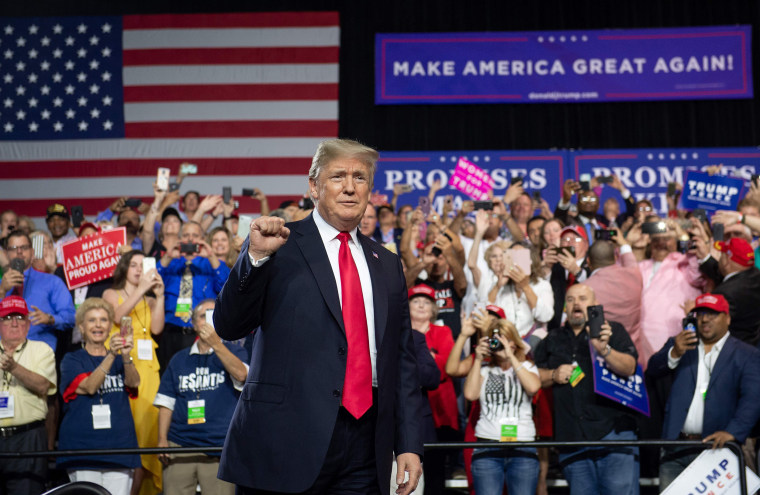TAMPA — A key member of President Donald Trump's gallery of personal villains was missing when he campaigned here Tuesday night: special counsel Robert Mueller.
The federal prosecutor investigating the Trump operation's ties to Russia and possible obstruction of justice was noticeably absent from the president's stump speech on the day former Trump campaign chief Paul Manafort went on trial in Virginia.
Often, Trump invokes the probe — which he calls a "witch hunt" — to rally crowds at his political events. He also tweets frequently about the investigation, and about Mueller personally, and peppers official remarks with broadsides against both.
The heat of the Mueller probe has been turned up this week, both because of the start of the Manafort trial and because Trump has begun moving the goalposts on what might be considered criminal activity. While he used to say that "there was no collusion" between his team and Russia during the 2016 election, he switched this week to arguing that "collusion is not a crime."
And in previous legal battles — most notably, over his original travel ban policy — Trump has found his public statements can be used against him in court.
On Tuesday, as he campaigned in Florida for his own re-election and for Republican candidates, including current Gov. Rick Scott, who is challenging Democratic Sen. Bill Nelson, and Ron DeSantis, who is seeking the GOP's gubernatorial nod, he added nothing to the litany of complaints he has lodged against Mueller and the special counsel's legal team.
Trump played most of the rest of his greatest hits against perceived enemies: He called out House Minority Leader Nancy Pelosi, Rep. Maxine Waters, D-Calif., Sen. John McCain, R-Ariz., the "fake news" and people who don't like Christmas.
In some cases, his condemnations were false.
For example, he accused Democrats of opposing legislation he signed that makes it easier for officials at the Department of Veterans Affairs to be fired.
"If somebody treated our veterans badly … you couldn’t say 'You’re fired,' he said. "Now you can say you’re fired."
"We had no help — very little — from Democrats," he said. "Not because it’s not right, but because they don’t want to give Trump any victory."
The Senate passed the bill unanimously, and it was co-sponsored by Nelson, whom Trump campaigned against Tuesday night. In the House, it passed with 137 Democrats voting in favor and 54 voting against.
The issue is particularly poignant in Florida, which is home to more than 1.5 million veterans, and for Nelson, who served on active duty during the Vietnam War.
Trump also mangled the truth when making the case for photo-identification requirements for voters.
"You know, if you go out and you want to buy groceries, you need a picture on a card," he said. Grocery stores do not generally require customers to show photo ID, though some wholesale membership clubs such as Costco and Sam's Club now do.
Still, Trump's claim that non-citizens can't buy food is as unsupported by evidence as the justification for his voter-ID push: the false assertion of widespread fraud during the 2016 election. The president created a high-profile voter fraud commission shortly after taking office. Early this year, it was disbanded after failing to find any evidence of widespread voter fraud.
But the crowd here — as boisterous as any at a recent Trump rally — didn't seem to notice or care much about the details. Hours before Trump arrived, they chanted "C-N-N sucks." Later, they rewarded the president with rounds of "build the wall" and "lock her up" when he mentioned his push for a border barrier and his 2016 opponent, Hillary Clinton, respectively.
The only addition to the standard stump speech he's delivered across the country in recent weeks was the number 4.1 percent. That's the Commerce Department's tabulation of second-quarter GDP growth for the country, a four-year high. The number was rolled into Trump's standard rhetoric about the economy under his watch, including a robust stock market and low unemployment.
Those lines will become familiar to Americans over the course of the next few months, as Trump has promised to campaign for GOP candidates six or seven days a week between Labor Day and the midterm elections in November.
His next stop is Thursday in Wilkes-Barre, Pennsylvania — a state that, like Florida, he won narrowly in 2016.
